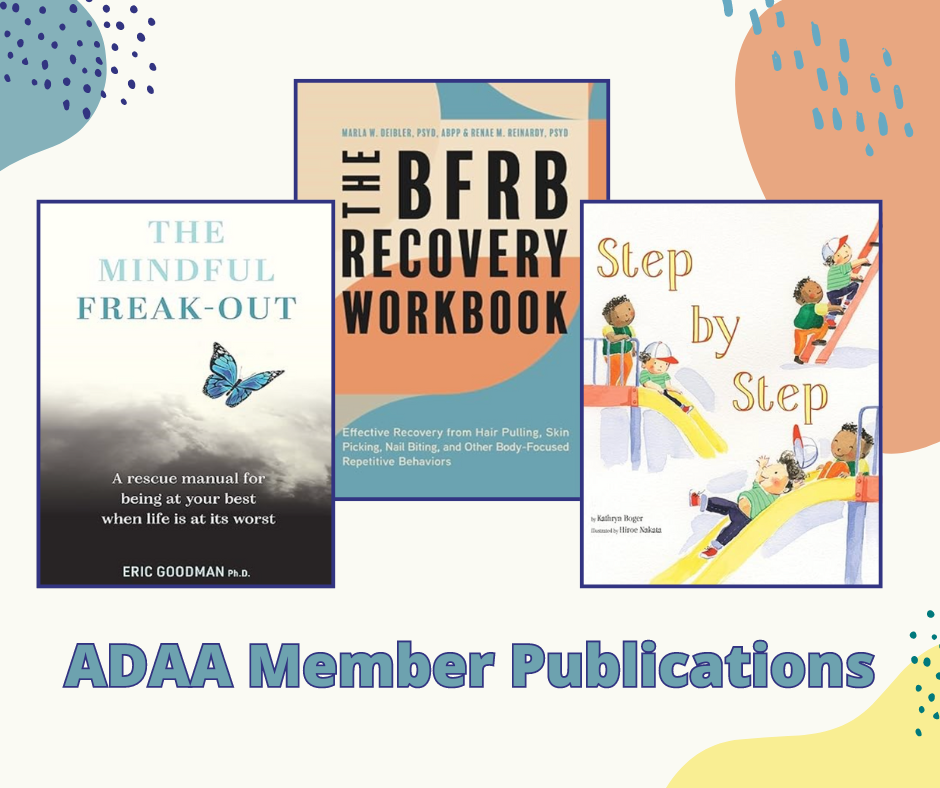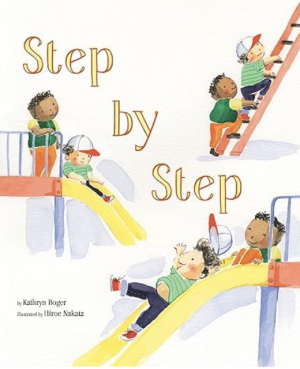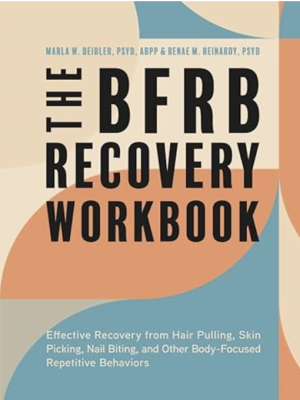New ADAA Member Books: Spring 2024
New ADAA Member Books: Spring 2024


Compassion-based and Mindful, New Book Aims to Help with Those Freak-Out Moments
You don’t often see the words ‘mindful’ and ‘freak-out’ in the same sentence, much less think of them as behaviors that can work together. But ADAA member Eric Goodman, PhD, in his latest book, postulates, rightfully so, that there will always be times when we do or feel like we need to “freak out” and that we can actually do so in a mindful way.
The Mindful Freak-Out – A rescue manual for being at your best when life is at its worst reminds us that whether we suffer from a mental health disorder like anxiety or panic disorder, or we just feel overwhelmed, distressed, or out of control, “freaking out” is a natural response that we can learn to regulate.
Dr. Goodman says The Mindful Freak-Out came out of his concern for the collective struggles and distress people all over the world were going through during COVID. An emotionally charged and extremely challenging time, the pandemic, especially when it came to responding to threat and how we acted and reacted in a time of distress, tried our emotions. It’s no wonder many of us panicked, suffered from anxiety, or allowed our threat-instinct to override our values and rational thinking.
“I originally intended to write a book for people struggling with panic attacks, but then came COVID,” the California-based psychologist said. “People were struggling collectively, hoarding items, acting irrationally, panicking together, and the rates of suicide and substance abuse surged.”
The author and clinical practitioner told ADAA that the impact of the pandemic led him to work on a more compassion-focused acceptance and commitment therapy (ACT) approach for responding to highly distressing moments or situations. Written for the general public, The Mindful Freak-Out differs from other books on ACT in its compassion-based focus and how the author weaves compassion-focused therapy (CFT) principles into his practice. What does that mean for the client?
“The goal is not only to have the psychological flexibility to choose a values-based response to a difficult moment, but to actively work on easing the client’s suffering at the same time,” says Dr. Goodman, pointing out that compassion helps shift a mindset from threat to caring, which can have “massive biological and interpersonal implications”.
It’s easy and common for our primitive “threat-system” to take over when we are afraid or in distress and we might find ourselves saying or doing something we regret later. Dr. Goodman gives the example of an angry couple yelling at each other during a disagreement.
“Would anyone in a moment of calm, rational thinking select that behavior as a way to persuade their loved one of something? Or when someone feels highly anxious and they either flee a desired social activity or stay while clenching their muscles and holding their breath?” he asks, reminding us that these behaviors get chosen for us, not by us.
By using compassion-focused ACT strategies, Dr. Goodman believes we can get back in control of our lives when difficult moments arise. Learning to get off autopilot is arguably the most important concept in mental health and well-being, he says.
Order The Mindful Freak-Out here.

Step by Step, Bit by Bit, Your Child Can Handle It, New Book Shows
With children and mental health, we know that the earlier a parent or caregiver intervenes, the better the outcome for the child. All children have moments of fear, trepidation, and avoidance, especially with new things and situations. But a child with anxiety or a diagnosed anxiety disorder will find it even more challenging, putting more stress and worry on the parents.
ADAA member Kathryn Boger, PhD, ABPP, has devoted her career to working with children who have anxiety. She has seen how helpful it can be to plant the seed, early on, about the importance of children taking steps to face the things that feel scary rather than avoiding them and the need for parents and caregivers to have language and tools to support their children in the process.
Co-Founder and Chief Clinical Officer of InStride Health, an ADAA partner, Dr. Boger says her children’s illustrated book, Step by Step, is meant to be both engaging for children and their parents while also educational. She told ADAA that she wanted to write a fun picture book that sends the message that, little by little, children can and should do things that feel new and scary so that their brains learn they can handle it. The book provides a saying or mantra to reinforce this concept.
“I included a mantra throughout the book so it would stick,” the author said, “and periodically I hear my own kids repeating it to themselves. That makes me hopeful that other children will do the same.”
Relating to the title and the main character of the book, the mantra “Step by step, bit by bit, Sam learns he can handle it” is helpful, easy to remember, and offers children a fun way to insert their own name into the message and empower themselves.
“Scary or overwhelming situations can be broken up into small steps so they feel more manageable,” Dr. Boger adds, “and parents can support kids by providing a combination of empathy and encouragement. Sam and his mom model this in the book.”
Step by Step can be read to children by their parents or caregivers. It can also be used by teachers, therapists, or any other professionals supporting children as they try things that feel new and scary.
Order Step by Step here.

BFRB Recovery with a New Workbook Using Evidence-Based Science and Compassion
A new book written by two ADAA members aims to empower individuals and professionals alike to navigate the complexities of Body-Focused Repetitive Behaviors (BFRBs) with empathy and confidence, while fostering greater understanding, self-compassion, and psychological flexibility.
The BFRB Recovery Workbook by Marla Deibler, PsyD, ABPP and Renae Reinardy, PsyD is a step-by-step, strengths-based guide for older adolescents and adults seeking a self-help toolkit for BFRBs. Also a comprehensive resource for clinicians to provide state-of-the-art, evidence-based support to their clients living with a BFRB, the book was a labor of love for the two psychologists. Drs. Deibler and Reinardy, who have specialized in BFRBs for over two decades, were motivated to produce this book by their passion to enhance treatment outcomes and the overall quality of life for those living with BFRBs.
“Our hope is for readers to embrace the pursuit of a full, meaningful life on their journey to recovery and beyond,” the authors told ADAA. “This guide facilitates self-reflection and encourages individuals to approach their BFRBs with curiosity and self-compassion, rather than struggle and resistance.”
BFRBs like hair pulling, nail biting, and skin picking can be both mentally and physically damaging and are indicative of complex experiences, the psychologists add. Their book offers an innovative, cohesive, self-directed approach to improve quality of life by changing one’s relationship to BFRB experiences and broadening tools to manage the behaviors more effectively.
“They (BFRBs) are both signals and responses: signals that there are internal discomforts and responses to try to manage those discomforts,” Dr. Deibler said. “These attempts at self-regulation are effective in the short-term, but further reinforce the behavior cycle in the long-term.”
The BFRB Recovery Workbook brings together the most empirically supported behavioral strategies from both traditional cognitive behavioral therapy (CBT) and third-wave therapies - contemporary therapies such as acceptance and commitment therapy (ACT) and dialectical behavioral therapy (DBT).
The authors want to help readers/users of the guide view their experiences as opportunities for growth, allowing them to meet their discomforts and urges with self-compassion and flexibility. Having these skills, the BFRB experts believe that those who suffer from body-focused repetitive behaviors can manage not only their experiences, but also improve the ways in which they relate to themselves and to the world around them.
“Freeing oneself from this pattern lies in the willingness to change one’s relationship to their BFRB experiences,” said Dr. Reinardy.
Order The BFRB Recovery Workbook here.
View ADAA's bookstore of our members' self-help books.
Read all of the ADAA Member Book Blogs here.























